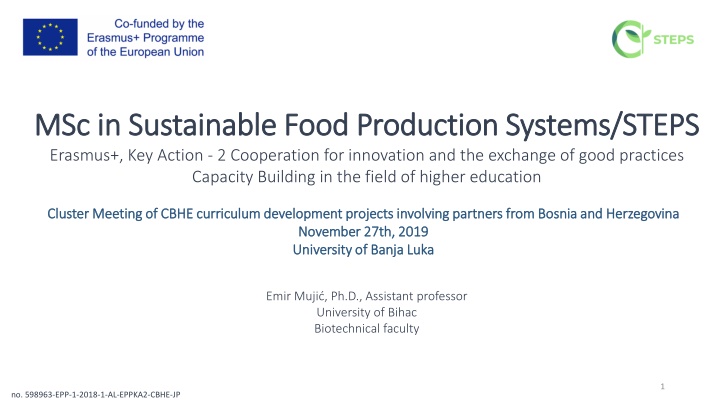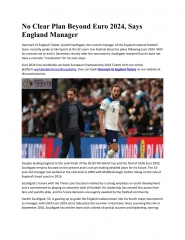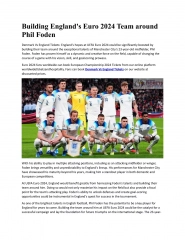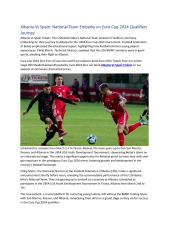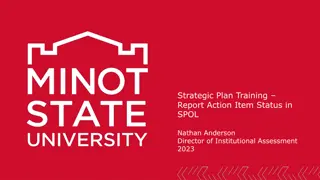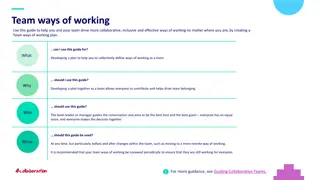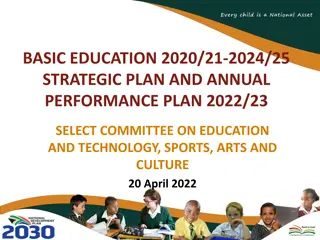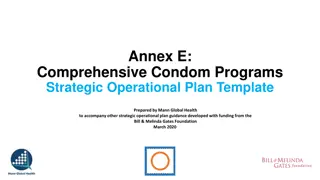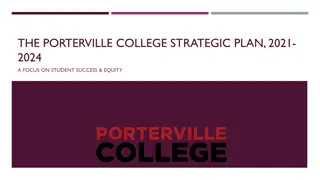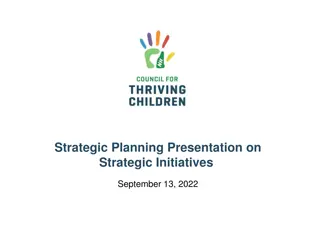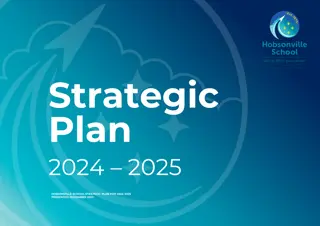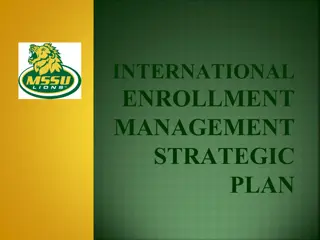TEAM.RCD Strategic Plan - December 5, 2024
This strategic plan outlines the mission, goals, and actions of TEAM.RCD focusing on promoting conservation practices, public education, and sustainable community development. Key words like stewardship, sustainability, and collaboration are emphasized along with areas of focus such as internal operations, external relations, fiscal management, education, and sustainability. Specific goals and actions are detailed for each area to ensure efficient and effective operations to achieve the mission statement.
Download Presentation

Please find below an Image/Link to download the presentation.
The content on the website is provided AS IS for your information and personal use only. It may not be sold, licensed, or shared on other websites without obtaining consent from the author.If you encounter any issues during the download, it is possible that the publisher has removed the file from their server.
You are allowed to download the files provided on this website for personal or commercial use, subject to the condition that they are used lawfully. All files are the property of their respective owners.
The content on the website is provided AS IS for your information and personal use only. It may not be sold, licensed, or shared on other websites without obtaining consent from the author.
E N D
Presentation Transcript
MSc in Sustainable Food Production Systems/STEPS MSc in Sustainable Food Production Systems/STEPS Erasmus+, Key Action - 2 Cooperation for innovation and the exchange of good practices Capacity Building in the field of higher education Cluster Meeting of CBHE curriculum development projects involving partners from Bosnia and Herzegovina Cluster Meeting of CBHE curriculum development projects involving partners from Bosnia and Herzegovina November 27th, 2019 November 27th, 2019 University of Banja Luka University of Banja Luka Emir Muji , Ph.D., Assistant professor University of Bihac Biotechnical faculty 1 no. 598963-EPP-1-2018-1-AL-EPPKA2-CBHE-JP
STEPS Consortium - 11 partners Program countries (4 PC) Partner countries (7 PC) AUT (P1) - Albania (coordinator) CULS (P8) - Czech Republic UET (P2) - Albania USAMVB (P9) - Romania UHZ (P3) - Kosovo TEISTE (P10) - Greece UC (P4) - Kosovo ReadLab (P11) - Greece UNBI (P5) - Bosnia & Herzegovina UNSA (P6) -Bosnia & Herzegovina MESCS USK (P7) - Bosnia & Herzegovina Project duration: 15 15. .01 01. .2019 2019- -15 15. .01 01. .2022 2022 2
Tangible and intangible results achieved done so far; Assessment and analysis report on stakeholders needs Research was performed in order to specify the most important issues of the transition to sustainable food production systems and design questionnaires, interviews, meetings and round tables with stakeholders. Survey of STEPS relevant programs The report should provide an analysis of the structure and the contents of MSc programs related to food production systems, in particular those that provide advanced knowledge of sustainable practices, from technical (engineering), management and institutional points of view. Review and analyses of best practices The main objective of the study is to identify the best practices in sustainable food system master programs. 3
Tangible and intangible results achieved Report on the mechanisms for continuous stakeholders input Contact information of stakeholders was presented in detail in order to be used for delivering questionnaires, organizing meetings, roundtables, workshops etc., and offer them the opportunity to be engaged with project activities. STEPS structure and courses The report should present the design of the MSc programme in relation to the specific needs identified during the preparatory tasks, the vision and the strategic goals of national educational policies. Selection of faculty staff and organization in working groups report A list of the names and contact information of the scientific staff organized in working groups, according to their scientific background and in order to develop the STEPS 4
Tangible and intangible results achieved Currently in progress: Design of STEPS courses The report will first provide the list of the courses which will be developed in two groups, analysed in deliverable "STEPS structure and courses Scientific staff of AUT, UHZ, UNBI, USAMVB and ReadLab will design the courses related to food engineering, quality and safety. Scientific staff of UET, UC, UNSA, CULS, TEISTE and ReadLab will design the courses related to Food production systems management. Seminars and lectures - seminars and lectures will be organized by partner countries HEIs. ICT centres (Teaching/learning environment) Research labs The tender procedure for purchase of equipment is ongoing Web site - The project website was developed early in the project and will be maintained after the project lifetime Social media profile and dissemination material- Social media (facebook, twitter etc.) profiles are created to inform about the progress of the project. 5
Impact observed and sustainability prospects The new MSc STEPS programme will offer a holistic approach of food production systems and put in the core the sustainability dimension. Short term impact: Acquire knowledge of the needs in terms of educated and skilled people needed to support the transition to sustainable food production systems, Improve the level of knowledge offered and the teaching/learning environment, develop laboratories and institutional capacities, Delivery of knowledge and development of human capital, Professional development of scientific staff, Long term impact: Modernization of education/Improve the quality and relevance of the educational system, Promote inter-university cooperation and cooperation between HEIs and the world of work, Improve engineering and management practices related to food production, processing, quality monitoring and sustainability of agro-food systems and processes in national/regional level, Contribute to the raising of investments and the socio-economic development at national/regional and EU level 6
Impact observed and sustainability prospects Focused exploitation activities will be performed during the project lifetime, including development of a post-project sustainability strategy that will provide specific measures to establish close cooperation between HEIs and stakeholders and ensure the sustainability of the MSc programme. Among others, they will include: recruitment of most recognized professors and young researchers with significant scientific background and vision, multiplication and up-scaling of the MSc programme and identification of co-funding schemes and projects. 7
Challenges encountered so far: Internal (in our institution) constraints are mainly related to tender procedures. external (in partnership or beyond) constraints linked to visa procedure (too complicated) Break the deadlines in WP (due to the later start of realization) 8
